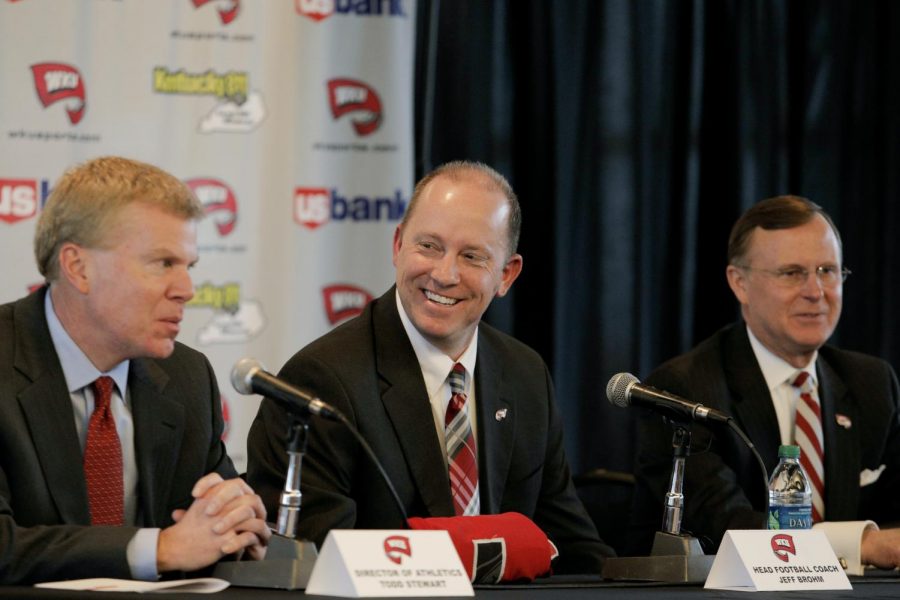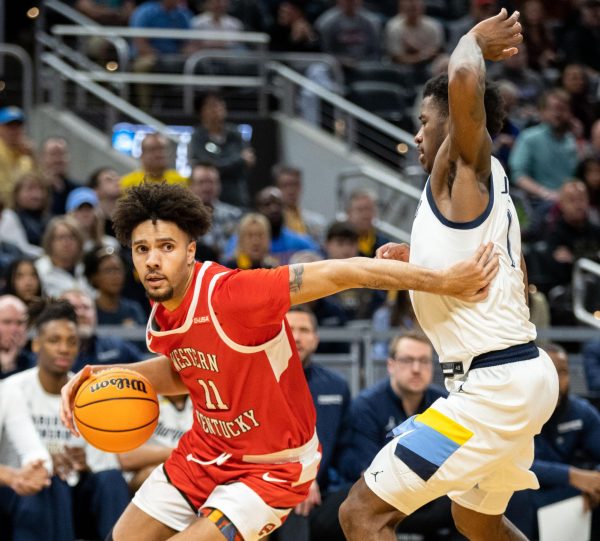Board of Regents approves Brohm’s contract
January 24, 2014
The WKU Board of Regents voted on and approved the athletic employment contract of new football coach Jeff Brohm at the first quarterly meeting Friday.
Brohm, who served last season as WKU’s offensive coordinator, was announced as the 19th coach of the Toppers Jan. 10 after former coach Bobby Petrino left for the same position at Louisville.
Faculty Regent Patti Minter was the only member of the board to vote against the coach’s contract, once again expressing her dissent of the financial concern of the contract.
Brohm’s contract, which lasts for four years, will pay $600,000 in annual salary with incentives: $50,000 for a winning percentage greater than .500, $50,000 for a bowl game victory, $25,000 if public season ticket sales exceed 12,000 per year and $50,000 for an academic progress rate (APR) of 950, then 970.
If Brohm terminates his contract without cause and accepts another coaching job at another FBS school before March 1, 2015, he will owe WKU $1.5 million.
Minter found light in one area of Brohm’s contract – a non-compete clause.
Brohm’s contract states: “In the event that COACH terminates without cause, or resigns/retires, COACH agrees that for a period of two (2) years following said termination, he will not accept employment or render any services to the intercollegiate football program of any other college or university in the Commonwealth of Kentucky.”
But as Minter has expressed in previous meetings, specifically in last year’s meeting when the board approved Bobby Petrino’s contract, she is taking a stand not in spite of athletics, but for the sake of the university.
“I hear from people that the coach is a good hire and the players like him and all good things, but the point remains the same that we can’t afford this and the situation grows more serious every year,” Minter said. “…we’ve made a long-term financial commitments to athletics – a shift that escalated last year, but began in 2006 when the board made the decision to go to FBS and we had promises of increased ticket revenues, television revenue and this hire is more in the same.”
Minter cited the Knight Commission of Intercollegiate Athletics’ report on trends in spending and institutional funding that as of 2011, football spending per scholarship football player has increased 90 percent over the last six years prior to the report.
Minter continued to cite the report comparing spending on athletes to full-time equivalent students stating that in 2011, WKU spent $11,695 per full-time equivalent student, up 30 percent since 2005.
President Gary Ransdell, however, stated the Knight Commission’s report is “flawed”, saying the report only considers certain aspects of spending between FTE students and athletes.
Athletics director Todd Stewart told the board that WKU’s athletic budget was significantly below average to many of the schools they will compete against in Conference-USA and that to stay competitive, salaries and expenses such as this must be approved.
“75 percent of the programs in the country have an athletics budget greater than $25 million, and ours is $21 million,” Stewart said. “While it may seem as though coaching salaries and spending in other areas is escalating, in relation to our peers and people we compete with on an everyday basis, we are way below what would be considered average.
“The equalizer for us is people, and if we have good coaches and we can retain them, then that can offset a lot of the other challenges that we face. We’re investing in our people and our coaches.”

























